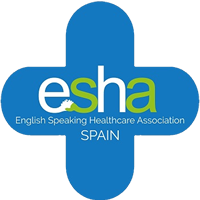Standardised patients (SPs), also known as simulated patients or sometimes standardised clients, are individuals who are trained to portray specific medical conditions, symptoms, or patient scenarios in a consistent and standardised manner. These individuals play a crucial role in medical education, healthcare training, and assessment by simulating real patients in clinical settings. Key points about the ESHA Spain Standardised Patient Programme include:
- Role and Purpose
-
- SPs are employed to simulate various patient encounters, including routine medical visits, physical examinations, diagnostic interviews, and even more complex scenarios.
- The primary purpose of SPs is to provide learners, such as medical students, residents, and healthcare professionals, with a realistic and standardized opportunity to practice clinical skills, patient interactions, and communication.
- Recruitment and Training
-
- SPs are carefully selected based on their ability to accurately portray specific medical conditions or patient profiles.
- They undergo extensive training to ensure they can consistently replicate the same clinical scenario, including the description of symptoms, emotional state, and response to questioning.
- Standardisation:
-
- Standardisation is a key aspect of using SPs. It ensures that each learner encounters the same clinical scenario, allowing for fair comparisons and assessments.
- Standardisation also extends to the feedback and evaluation provided to learners after their interactions with SPs.
- Scenarios
-
- SPs participate in scripted or structured scenarios that mimic real clinical situations. These scenarios can range from routine check-ups to emergency situations or challenging diagnostic cases.
- The scenarios are designed to cover various aspects of patient care, including history-taking, physical examination, diagnosis, treatment planning, and communication skills.
- Assessment
-
- SPs play a crucial role in assessing the clinical competence and communication skills of learners.
- After an encounter with an SP, learners receive feedback and evaluations based on their performance, including their ability to gather information, establish rapport, and make clinical decisions.
- Benefits
-
- Safe Learning Environment: SPs provide a safe and controlled environment for learners to practice and refine their clinical skills without the risk of harming real patients.
- Realistic Practice: Learners can engage in realistic patient interactions, which helps them develop empathy, improve communication, and enhance their clinical acumen.
- Skill Assessment: SPs are valuable for assessing learners’ clinical skills objectively and providing constructive feedback for improvement.
Standardised patients are essential components of medical education and ongoing healthcare training. They provide learners with a controlled and standardised way to develop and assess their clinical skills, ultimately improving the quality of patient care. This is a valuable asset for any healthcare provider in Spain and should form part of a quality ongoing training programme for any clinic or hospital offering their services in English.
If you would like more information on our Standardised Patient Service, please dont hesitate to contact us at welcome@eshaspain.org




